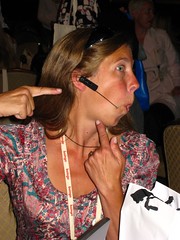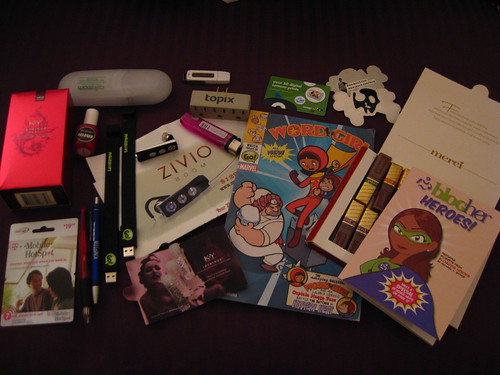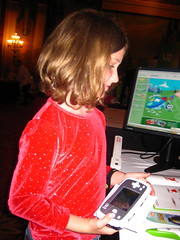We know where we are. But who are we? What are we as a group? Are we a thing? Are we a group?
This might sound weird from a feminist anarchist geek. But I had an epiphany at work during a marketing meeting.
Gina, our head of sales, was trying to describe to the rest of us what it’s like to explain blogging to Fortune 500 company ad executives. They’re used to putting people in demographics, and defining types of people who they recognize as categories. There are understandable archetypes like “soccer mom”. There are “communities”. The companies know that things can be viral and that online advertising is the way to go and that blogs are cool. But how to explain what we are? Who we are? Why we’re powerful? Why we’re not a fad?
Digression: At the first couple of BlogHer conferences I was not convinced that the conference sponsorships were a good idea. They didn’t sway me. I felt marketed-to in a way that wasn’t quite comfortable, or that felt slightly off. I wondered why it wasn’t like other tech conferences, other blogging conferences. Why because we were women, didn’t more big tech advertisers or companies come to us and sponsor us? Where were Apple and Microsoft trying to sell us laptops or giving us cool schwag – after all, we were hard core bloggers and geeks enough to go to a blogging conference.
And yet, the conference was fabulous, and I felt that even the companies who didn’t get it, I had some respect for them just for showing up and putting up some cash. Maybe we were an experiment. They were trying to get in on this rumored wave of online stuff even if they didn’t know how. This year, things were different. There were insane levels of corporate sponsorship, but the way it was done mostly didn’t feel odd or wrong or presumptive that all women were a certain way. It felt like they were *getting it*. I didn’t feel alienated. I was charmed. While it was strange to be having a KY sponsored party in Macy’s lingerie department while drinking chocolate vodka and eating cookies, there was no way not to be charmed by the strangeness and by the free 1GB flash drives. Rather than showering us with glossy, expensive brochures we would just throw away, they put their product ads on flash drives that we’d find useful. That gave me a warmer feeling than the cayenne in the hot chocolate vodka. (Despite the perturbing heteronormativity of the lube’s his and her packaging, which gossip I will repeat that hippietastically we had asked them to offset with equal amounts of her and her packaging but the ball got dropped somewhere.) It was smart marketing to women who love their computers – whose computers are important parts of their lives. Same with the clever presence of PBS Kids. They gave out stuff that you’d actually want to give to your kid – again with the flash drives, this time as bracelets. Mood rings. Stickers. Comic books. And even if you didn’t have a kid, you were a kid once, and might like to see Grover and Grover’s puppeteer in person in the studio that PBS set up inside our conference. iRobot had demos and a raffle for Roombas, and also sponsored a latte cart. How civilized is that — don’t just market to me: make me *like you*. Free lattes at a place that I was fairly desperate for nicer-than-hotel-coffee was smart.
That’s very different from the old wave of internet advertising and marketing, the clumsy approaches that feel like this: We guess who you are, without listening. Then we tell you why you’re interested in this thing. Then we beg you to blog about it. Then we measure our success by click-throughs.
Think of radio advertisements. A sponsor takes a ball game, something that people want to have. And says, “Hey. We’re cool like this. We love baseball. We make Blahdeblah Product. We’re helping it be so that you get to hear this baseball game on the radio.” Internet ads need to be more like that. Radio advertisers didn’t have little implants in our brains that gave them precise metrics of whether we *that second* turned our eyeballs to look at a Blahdeblah Product. Instead, they banked on our experential happiness, our participation and investment in the ball game. We’d have a good feeling about the game and our enjoyment, and associate them with it, like a friend. Instead, bad net marketing grabs your head, forces it into a vise clamp and makes you look away from the game and at them while you fill out their survey. It’s intrusive and untrusting, essentially unfriendly.
What I realized during our meeting: we aren’t a consumer demographic. We aren’t the metrics. We aren’t defined by what we consume in the mental model of 20th century markets. We’re cultural producers. Through our blogs, we have open, mass access to the means of production. We’re unmediated and unfiltered, if we want to be. We’re also banding together to control how we’re mediating and filtering. A big medical company might try to hire writers to tell their “true stories” of being moms with cancer. But they would never hit the grass roots authenticity of Motherswithcancer.wordpress.com. I can read that site and completely trust that it’s not the zombie brainchild of Big Pharma. I read BlogHer and trust that, while it’s got ads on it and (now) big corporate sponsors, it’s not a department store mannequin’s version of “what women want”. It’s what women actually got together and said they wanted to do. It’s not a marketing category.
We are something new, a category not quite defined but still coalescing, something like Bluestockings or the French revolutionary feminists who ran their own newspapers in the 1830s. But unlike those tightly knit salons of intellectuals, we are a mass movement, a populist movement, with plenty of muscle and — collectively — economic power. We are not quite like what some people are trying to define us as:
* “the Association of University Women, who also shop”
* “the white 30-something soccer moms who write cutesily about only diapers”
* “men with boobs and social skills, who influence their network of friends”
* “sort of like journalists, but with no self esteem and you don’t have to pay them”
* “computer geeks lite, who want a pink iPhone” (okay, maybe that one)
Or whateverall they seemed to think we were.
What we are: a mass social movement of women who are moving into the public sphere. We are not depending on authority to tell us what or who we are. If we don’t fit into a demographic or a marketing category, that doesn’t mean we don’t get a public voice. We are redefining “what women are” in our society and the shifting marketing and ad markets are evidence that our redefinition is being heard. Publishers can say “Your story is too harsh. It’ll alienate readers. Change it. Your main character can’t be a black woman. Write about something else. That story about your special needs child is too depressing. ” Sure, they can say it – and they do. We tell those stories anyway and find they are deeply wanted and needed by other women.
We’re more like the women of the 1800s who started to be able to make a living from their writing. (Though men generated an enormous backlash against them and trivialized their work as being from a pack of scribbling women… babblers and amateurs who appeal to the crude taste of the masses and are not Literary Enough (for… what exactly?).) Have we hit critical mass, finally, with blogging? Can we end run capitalist patriarchy? Are we successfully changing it as it co-opts us?
Older feminists are standing back in a mildly skeptical way. Oh yes, we’ve heard this before, now is really the moment when we can all tell our stories, across class and race and gender and all barriers, and our histories won’t be lost. Right. We’ve never heard *that* one before. I really believe it’s true this time. We have to fight to keep it true, and to keep control and power in the hands of regular people, accessible to everyone. Keep that access to t
he means of production, cultural production, out there, and keep spreading it.
And by that I mean things as simple as: fight your local library not to block MySpace from their public access computers.
I also felt this deeply at the Global Voices Summit in Budapest. The technology is to the point where mobile phone are ubiquitous in developing countries. A protest happens a country’s mainstream media can’t cover it because of censorship or a threatening political environment, and yet videos go up on YouTube. Fighting for universal access to a decentralized Internet is crucial to our future, and all areas of this fight need to tie together and be allies.
So who are we and what are we? Women who are speaking, who are consumers who talk, sort of like journalists, sort of like authors; we are conscious, individually and, more and more, collectively, of our power to speak and be seen in the world of public discourse. We have jobs and we’re in public, we’re out of the domestic sphere, but our thoughts, the way we’re framed in public conversations, in the media, isn’t yet all the way out of the domestic sphere. My point is that we are no longer containable by old style media. We aren’t an elite of “influencers” to be courted and co-opted. We’re journalists who write about who we are, not what we’re told to write, like a million mommy-blogging Hunter S. Thompsons writing The Curse of Lono instead of their assigned sports article.


